Bean-to-chocolate at Cacaodada
Craft chocolate pioneers branch out with chocolate jam
By Jean OhPublished : April 24, 2021 - 16:00
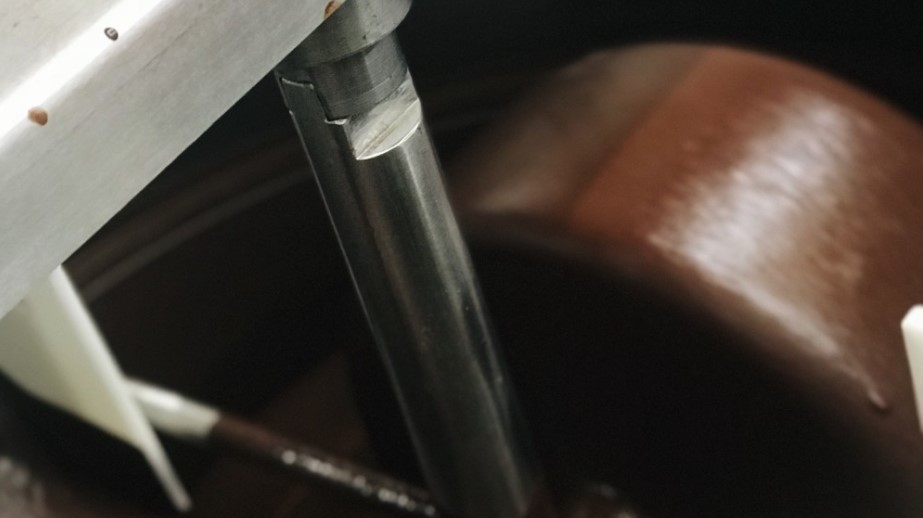
Chocolate crafter Yoon Hyung-won summed up Cacaodada’s approach to craft chocolate when he said, “While the term ‘bean-to-bar’ has long been used in the industry, one could say the term ‘bean-to-chocolate’ is actually easier to understand.”
This is certainly true for Cacaodada, which from its inception in 2016 not only makes chocolate bars from scratch but also brownies, cakes, drinking chocolate and more recently, chocolate jam.
Chocolate crafter Go Yu-rim, who founded Cacaodada with Yoon, explained how rather than turning to couverture chocolate, which is often used for chocolate work like crafting chocolate bonbons, Yoon went straight for the cacao bean.
This is certainly true for Cacaodada, which from its inception in 2016 not only makes chocolate bars from scratch but also brownies, cakes, drinking chocolate and more recently, chocolate jam.
Chocolate crafter Go Yu-rim, who founded Cacaodada with Yoon, explained how rather than turning to couverture chocolate, which is often used for chocolate work like crafting chocolate bonbons, Yoon went straight for the cacao bean.
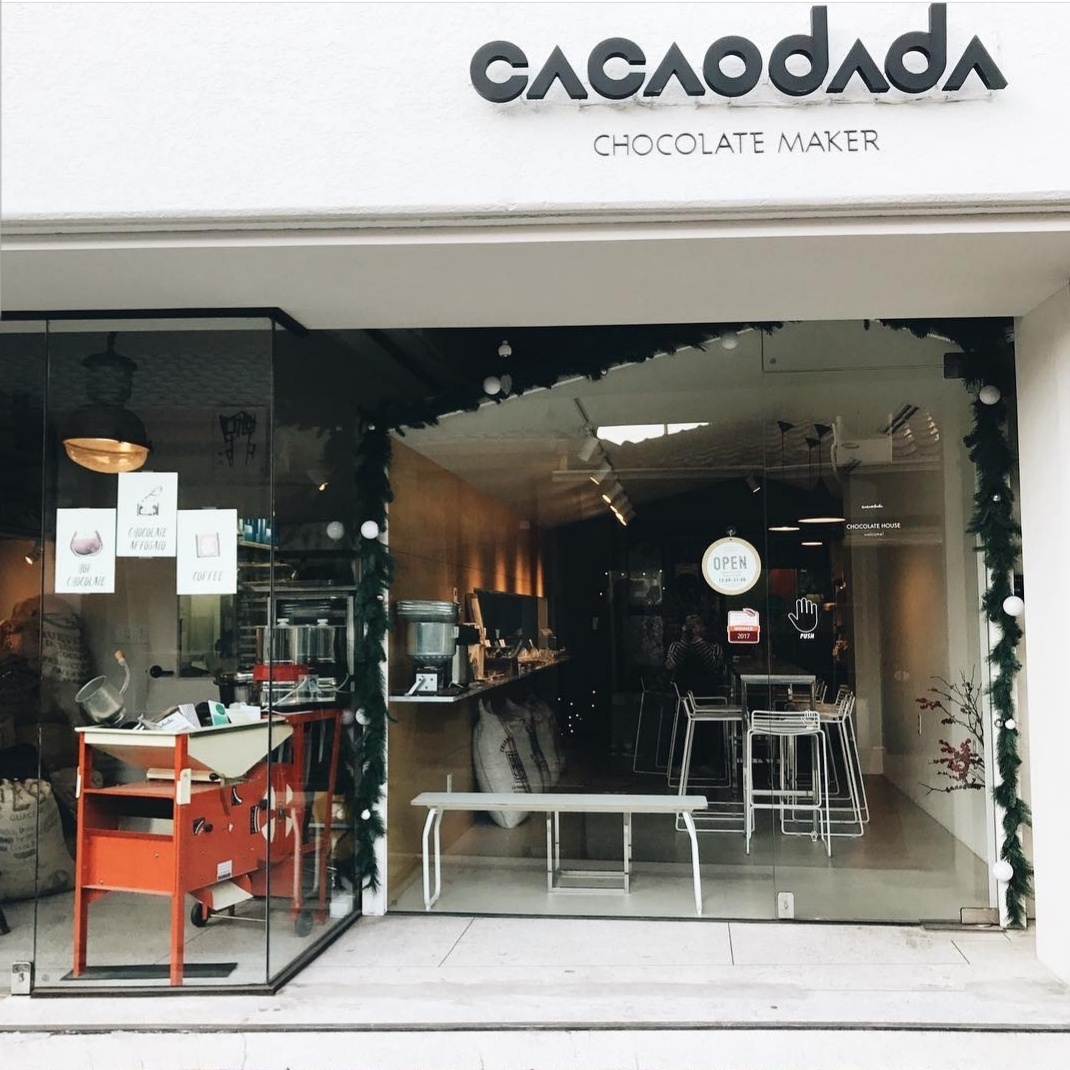
After studying and researching how to make bean-to-bar chocolate, Yoon and Go opened Cacaodada in Mapo-gu, Seoul, several years ago.
“We actually made our first bean-to-bar chocolate in 2011,” Yoon, 34, said in an email interview, adding that it took them five more years to launch Cacaodada, which is exclusively dedicated to crafting chocolate from scratch.
“We actually made our first bean-to-bar chocolate in 2011,” Yoon, 34, said in an email interview, adding that it took them five more years to launch Cacaodada, which is exclusively dedicated to crafting chocolate from scratch.
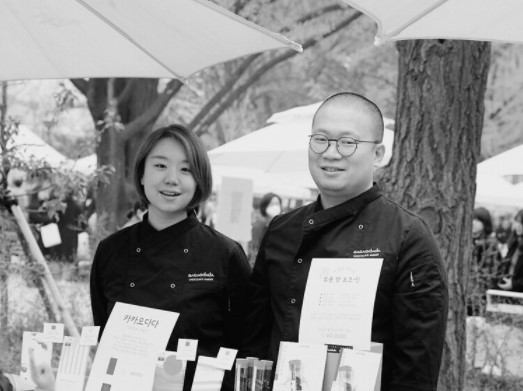
Just one year after opening Cacaodada, Yoon and Go started winning awards for their bean-to-bar chocolate, starting with the Bronze Award for the microbatch plain/origin dark chocolate bars category of the 2017 Asia-Pacific Competition of the International Chocolate Awards.
The award-winning chocolate, their single origin 70 percent Dominican Republic chocolate, boasts a fruity richness, a hint of almond and a lovely depth.
There is also the texture, very smooth and firm, gliding on the tongue and dissolving seamlessly, a sign that Go and Yoon took the conching process, the second to final step in chocolate making, very seriously.
Making chocolate from scratch is a time-consuming, arduous multistep process.
The award-winning chocolate, their single origin 70 percent Dominican Republic chocolate, boasts a fruity richness, a hint of almond and a lovely depth.
There is also the texture, very smooth and firm, gliding on the tongue and dissolving seamlessly, a sign that Go and Yoon took the conching process, the second to final step in chocolate making, very seriously.
Making chocolate from scratch is a time-consuming, arduous multistep process.
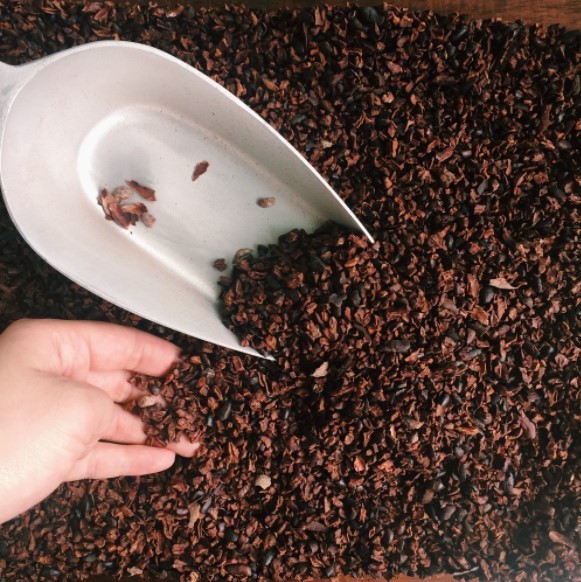
Before Go and Yoon even begin, cacao pods are harvested, the beans and pulp are removed from the pod and fermented and dried.
Go and Yoon -- who use cacao from Madagascar, Tanzania, Ghana, Peru and the Dominican Republic -- receive these beans, roast them and then remove the shells.
The resulting cacao nibs, which are also sold at Cacaodada and can be enjoyed sprinkled over yogurt, are then ground into chocolate liquor.
At this juncture, explaining the process that follows could get complicated but Yoon, 39, provided a simplified explanation, saying, “Sugar is added to the chocolate liquor and then the mixture is refined and conched for dark chocolate.”
Go and Yoon -- who use cacao from Madagascar, Tanzania, Ghana, Peru and the Dominican Republic -- receive these beans, roast them and then remove the shells.
The resulting cacao nibs, which are also sold at Cacaodada and can be enjoyed sprinkled over yogurt, are then ground into chocolate liquor.
At this juncture, explaining the process that follows could get complicated but Yoon, 39, provided a simplified explanation, saying, “Sugar is added to the chocolate liquor and then the mixture is refined and conched for dark chocolate.”
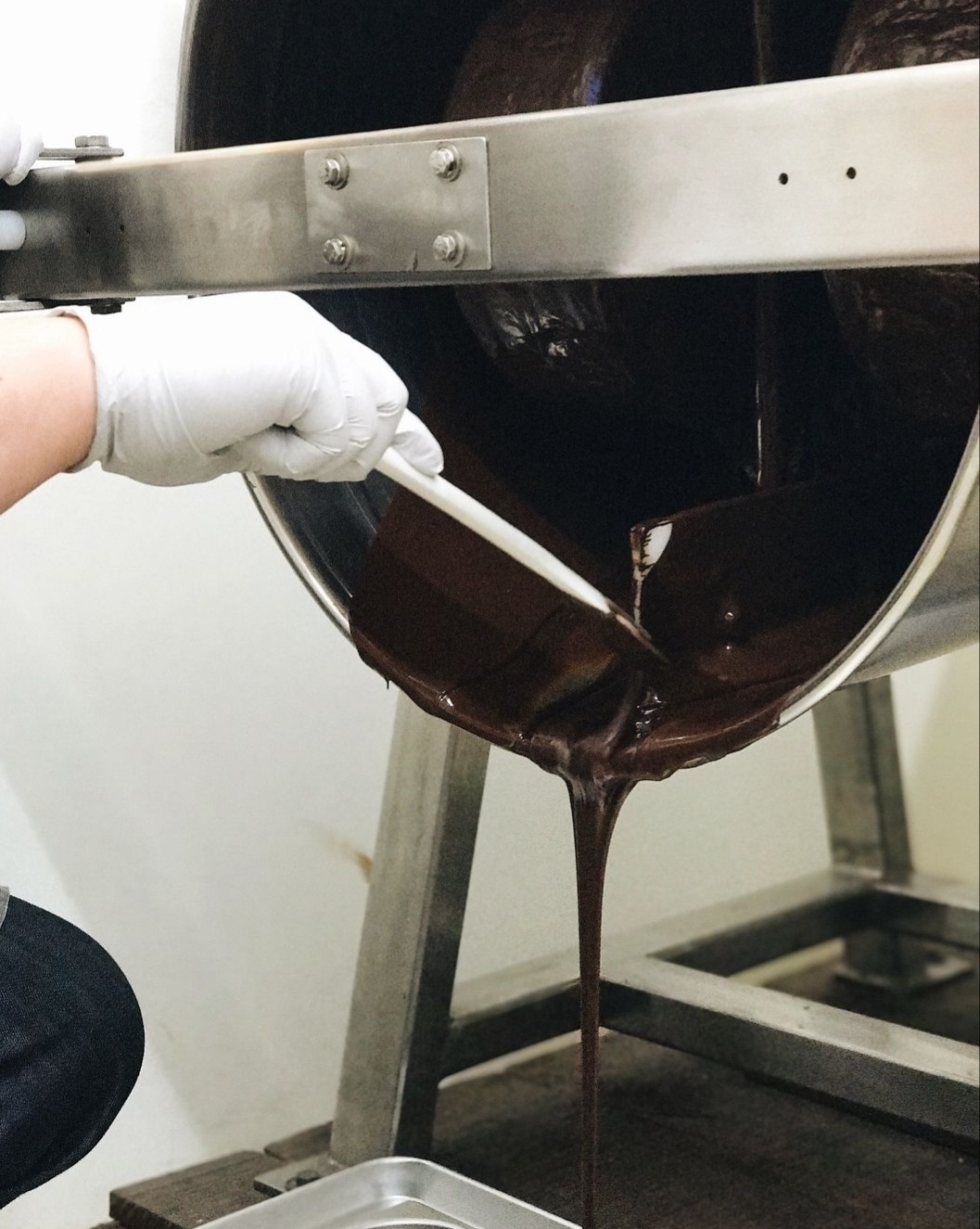
Conching, which is essentially the process of heating and mixing chocolate, is crucial, according to Yoon, in achieving an ideal mouthfeel while also ridding the chocolate of any unpleasant flavors or smells.
“Technically, one needs to make each particle under 50 micrometers in size, but if you make the particles too small or the particles are not even, then the texture and physical properties may worsen,” Yoon said. “The key is to achieve the appropriate particle size while bringing out the best chocolate flavor.”
Yoon elaborated that Cacaodada’s conching process takes anywhere from 24 hours to 72 hours to complete.
“During the conching process, we do not know when the chocolate will be finished so there are times when we check on the chocolate at dawn,” said Go.
“Technically, one needs to make each particle under 50 micrometers in size, but if you make the particles too small or the particles are not even, then the texture and physical properties may worsen,” Yoon said. “The key is to achieve the appropriate particle size while bringing out the best chocolate flavor.”
Yoon elaborated that Cacaodada’s conching process takes anywhere from 24 hours to 72 hours to complete.
“During the conching process, we do not know when the chocolate will be finished so there are times when we check on the chocolate at dawn,” said Go.
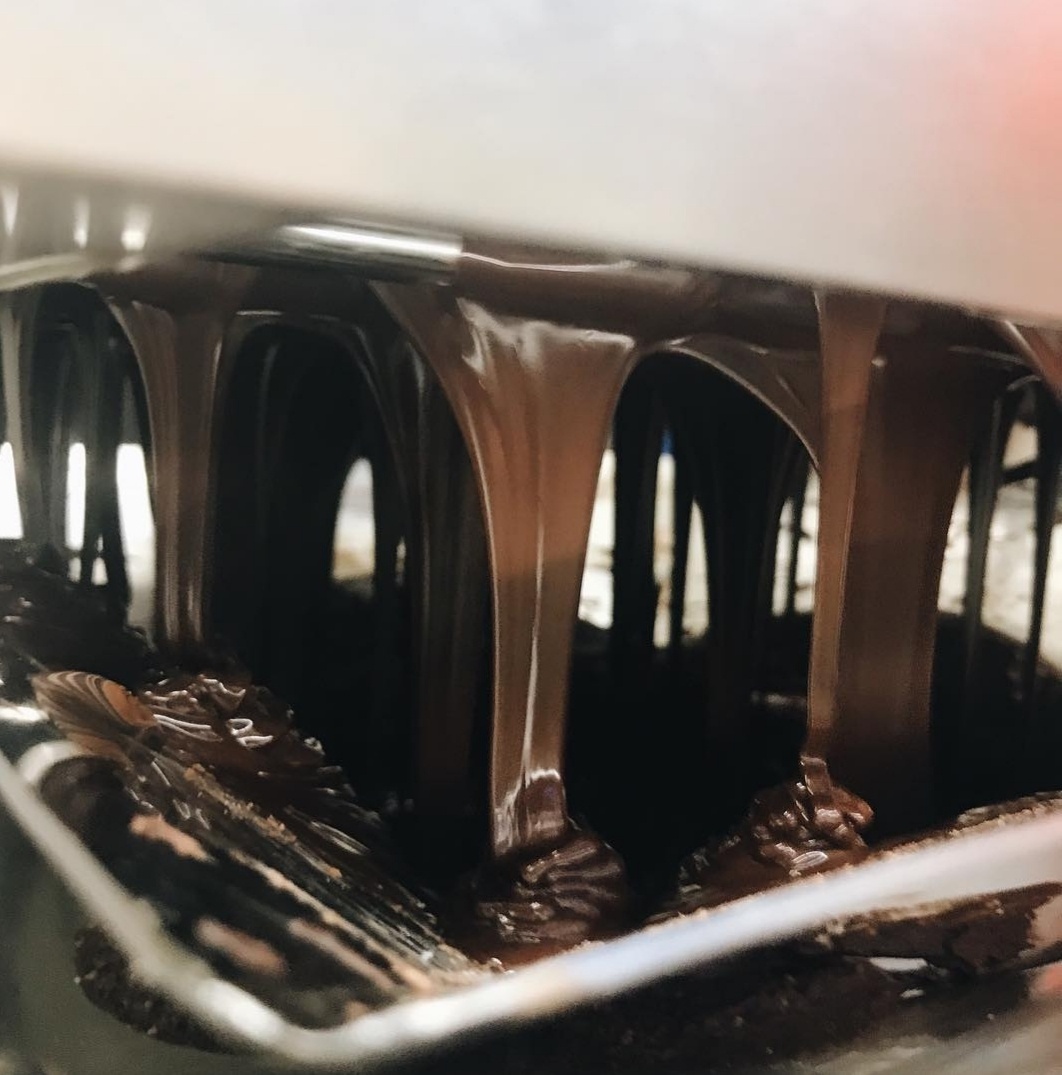
Normally, the final step would be to temper the chocolate and then pour it into molds for bars. However, for Go and Yoon, this will vary, for instance depending on whether or not their caramel-like chocolate jam crafted with cacao beans from Tanzania is being made or if the cacao beans are being ground into a paste for their 1++ brownies.
The jam, which Go and Yoon christened Tanzania Mud Sweets, was released in March, a follow-up, Go said, to the chocolate spread that was launched last year.
“We wanted to make a sauce that possessed the fresh taste of chocolate and could be used in a variety of ways,” Yoon said.
As to why cacao beans exclusively from Tanzania were used for their jam, Yoon explained, “I wanted to escape the prototypical chocolate flavors that we know. I wanted to showcase the good flavors of the cacao bean and the diversity of flavors of cacao.”
“Also, we felt the fresh fruit flavors of the Tanzanian bean would serve as an appropriate accent to a variety of foods,” Yoon added.
Yoon and Go were hesitant to reveal how the jam is made, only divulging that sun-dried salt aged for nine years is used to make these jam.
“The salt strengthens flavors that otherwise might come across more weakly on the palate,” Yoon said.
The jam, which Go and Yoon christened Tanzania Mud Sweets, was released in March, a follow-up, Go said, to the chocolate spread that was launched last year.
“We wanted to make a sauce that possessed the fresh taste of chocolate and could be used in a variety of ways,” Yoon said.
As to why cacao beans exclusively from Tanzania were used for their jam, Yoon explained, “I wanted to escape the prototypical chocolate flavors that we know. I wanted to showcase the good flavors of the cacao bean and the diversity of flavors of cacao.”
“Also, we felt the fresh fruit flavors of the Tanzanian bean would serve as an appropriate accent to a variety of foods,” Yoon added.
Yoon and Go were hesitant to reveal how the jam is made, only divulging that sun-dried salt aged for nine years is used to make these jam.
“The salt strengthens flavors that otherwise might come across more weakly on the palate,” Yoon said.
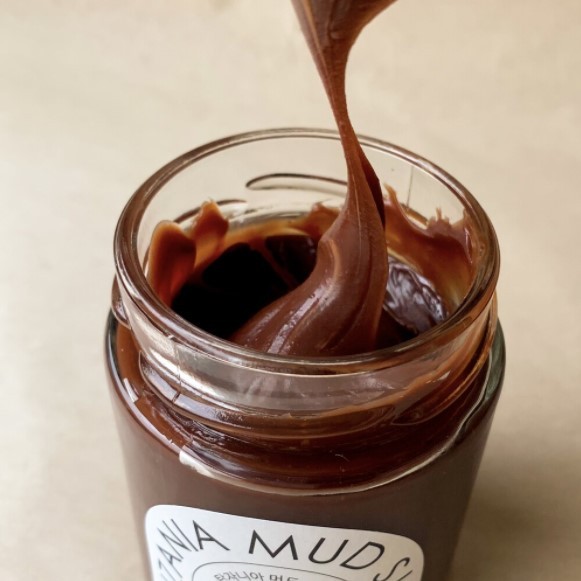
The resulting jam possesses a very thick, gooey consistency and unfolds like butterscotch and caramel on the tongue before transitioning into the rich flavors of cacao with a wine-like fragrance and a red berry end note.
While the official website recommends various ways to use it, the jam actually tastes good straight out of the jar by the spoonful, if one is so inclined.
By Jean Oh (oh_jean@heraldcorp.com)
While the official website recommends various ways to use it, the jam actually tastes good straight out of the jar by the spoonful, if one is so inclined.
Cacaodada
15, Huiujeong-ro 10-gil, Mapo-gu, Seoul
Open Thursdays through Saturdays from 11:30 a.m. to 8:30 p.m., closed Sundays through Wednesdays
(02) 3446-7007; www.cacaodada.com; @cacaodada
Chocolate bars cost 5,000 won to 32,000 won, cacao nibs and caviar cost 5,000 won to 6,000 won, chocolate spreads cost 17,000 won to 19,000 won, drinking chocolate costs 14,000 won to 15,000 won, brownies cost 5,000 won.
Chocolates, brownies, jams, drinking chocolate and cacao nibs can be ordered online on the Cacaodada website.
15, Huiujeong-ro 10-gil, Mapo-gu, Seoul
Open Thursdays through Saturdays from 11:30 a.m. to 8:30 p.m., closed Sundays through Wednesdays
(02) 3446-7007; www.cacaodada.com; @cacaodada
Chocolate bars cost 5,000 won to 32,000 won, cacao nibs and caviar cost 5,000 won to 6,000 won, chocolate spreads cost 17,000 won to 19,000 won, drinking chocolate costs 14,000 won to 15,000 won, brownies cost 5,000 won.
Chocolates, brownies, jams, drinking chocolate and cacao nibs can be ordered online on the Cacaodada website.
By Jean Oh (oh_jean@heraldcorp.com)


















![[Today’s K-pop] Treasure to publish magazine for debut anniversary](http://res.heraldm.com/phpwas/restmb_idxmake.php?idx=642&simg=/content/image/2024/07/26/20240726050551_0.jpg&u=)